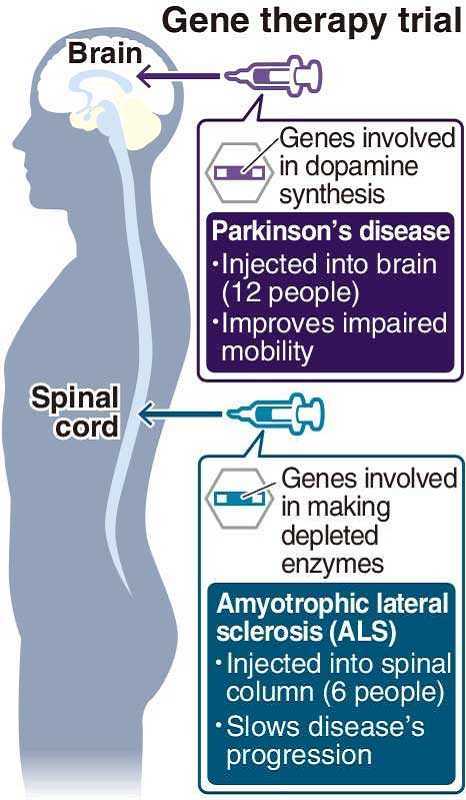Gene therapy trial could offer hope for ALS, Parkinson’s patients

13:53 JST, September 24, 2022
A clinical trial in which patients with Parkinson’s disease or amyotrophic lateral sclerosis (ALS) are injected with a genetic medicine that is hoped to have therapeutic benefits could begin as soon as this winter.
This will reportedly be the first time gene therapy has been used to tackle ALS in Japan. The research team planning to conduct the trial, which includes researchers from Jichi Medical University, has started seeking patients to participate.
ALS progressively affects the nerve cells that control voluntary muscle movements and causes muscles to atrophy. The depletion of a certain enzyme is thought to be one cause of ALS.
Parkinson’s disease occurs when the body is unable to produce sufficient levels of dopamine, which conveys messages controlling movement in the brain. This causes tremors or difficulty moving.
It is estimated that about 10,000 people in Japan have ALS, and about 150,000 have Parkinson’s. Currently, there is no fundamental cure for these diseases.
The gene therapy used in the trial aims to replenish the depleted enzyme or dopamine level. The genes required for this process will be administered to the patients as a therapeutic drug. A single dose is expected to have an effect over a long-term period of many years.
According to the research team’s plan, the trial will focus on patients with sporadic ALS, rather than inherited cases. The drug will be injected around the spinal cord area of six people whose symptoms appeared less than two years ago. Trials conducted on mice confirmed the treatment was effective in slowing down the progression of ALS.
“This trial’s primary objective is to confirm the safety of this process,” said Jichi Medical University Prof. Mitsuya Morita, a neurology expert. “But we’d also like to check whether the treatment has any effect on slowing down the progression of this disease.”
The treatment was already administered to some Parkinson’s disease patients during an earlier stage of the research, and has shown signs of improving their movement. Twelve people will receive this treatment during the trial.
Juntendo University Prof. Nobutaka Hattori, a neurology expert, said: “Gene therapy could become one option for diseases that essentially have no cure. I expect they could supplement treatments involving oral medicines that gradually become less effective for cases of Parkinson’s and also treatments for slowing the progression of ALS.”
"Society" POPULAR ARTICLE
JN ACCESS RANKING







